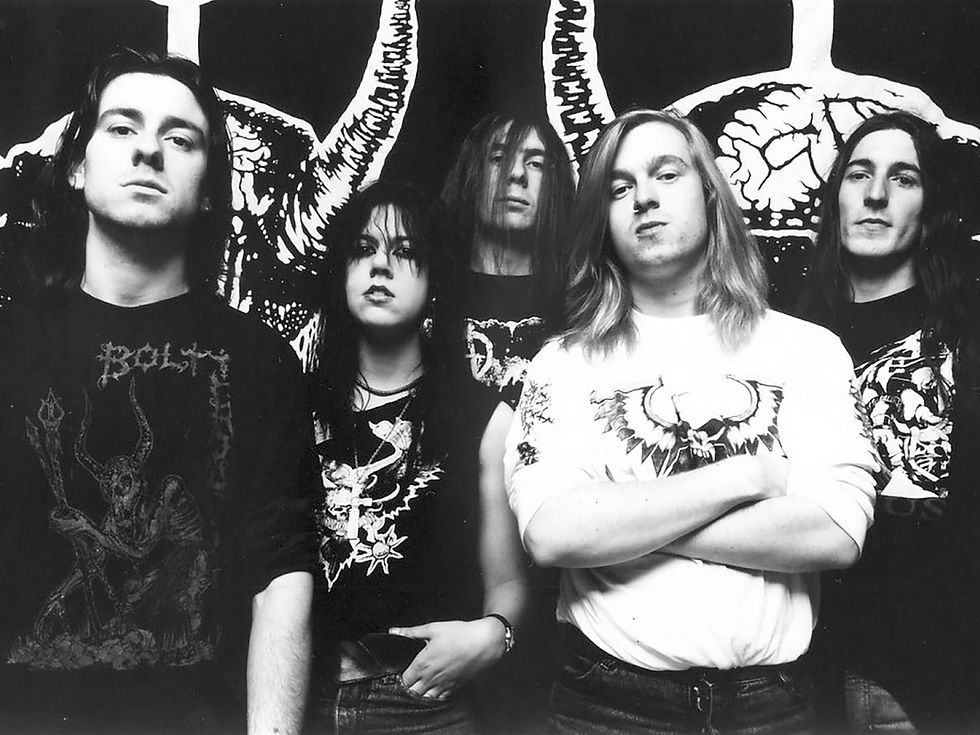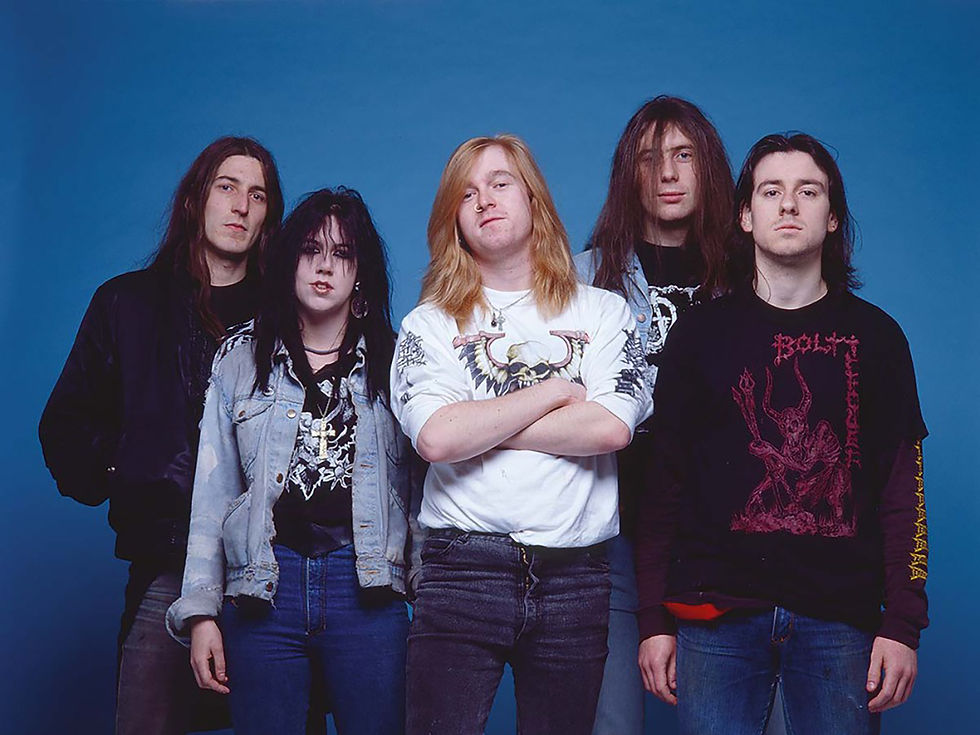March of the Underrated: A Spotlight on Bolt Thrower
- Rakkan

- Dec 22, 2024
- 5 min read
Updated: Mar 28, 2025
At Decibel Warfare, our mission centers on underrepresented bands across all genres of the metal scene, giving a platform to those whose musicianship often goes unnoticed. While we typically highlight emerging acts and hidden gems, we also believe in celebrating bands that, despite their monumental contributions, remain criminally underrated. This brings us to the legendary Bolt Thrower, a band that may no longer exist, but whose legacy resonates as powerfully today as it did during their peak.
I was incredibly fortunate to see Bolt Thrower live twice in 2006, and those shows remain unforgettable. Their performances were nothing short of electrifying, a jaw-dropping display of raw power and unrelenting intensity that few bands can match.

But what does it truly mean to be underrepresented? The word itself carries layers of meaning. It suggests a lack of mainstream breakthrough, where the band’s music hasn’t achieved the widespread recognition it deserves, even within niche communities. It also means that, despite their influence and the appreciation of their devoted fans, the band remains unknown to many, even among metal’s most dedicated audience. Finally, underrepresentation points to a lack of coverage or recognition in the broader conversation about music, where their contributions often get overshadowed by flashier, more commercial acts.
When we dig into the data, Bolt Thrower’s underrepresentation becomes even more apparent. On Spotify, they average around 155,000 monthly listeners—a respectable number for a disbanded death metal band, but shockingly low considering their impact on the genre. By sheer streaming metrics, they wouldn’t even crack the top 20,000 most-streamed artists on the platform. That’s staggering for a band that many consider foundational to death metal, showing just how overlooked they are in the digital age.
This is what underrepresentation looks like. Despite their legendary status among devoted fans, Bolt Thrower exists in the shadows of streaming playlists and music algorithms. It’s an obvious reminder of the imbalance in how recognition is distributed, even within niche genres like death metal. For us at Decibel Warfare and for me personally, highlighting bands like Bolt Thrower is about correcting that imbalance, bringing overdue attention to their unparalleled legacy.
March to Glory
Bolt Thrower was formed in Coventry, England, in 1986 by guitarist Gavin Ward and bassist Jo Bench. Their name was inspired by the tabletop game Warhammer 40,000, reflecting the war-themed aesthetic that would define their career. After releasing a demo in 1987, they caught the attention of Earache Records, which released their debut album, In Battle There Is No Law!, in 1988.

Over the years, the band underwent several lineup changes, with Karl Willetts joining as the lead vocalist and Barry "Baz" Thomson on guitar solidifying the core group. Bolt Thrower released a series of critically acclaimed albums throughout the 1990s and 2000s, including Realm of Chaos (1989), The IVth Crusade (1992), and Those Once Loyal (2005), with a brief stint on Metal Blade Records. Despite achieving a loyal fan base and critical respect, they remained largely outside the mainstream.
In 2015, drummer Martin Kearns passed away unexpectedly, prompting the band to cancel their tour and eventually disband in 2016. This marked the end of Bolt Thrower’s three-decade-long career.
Why Bolt Thrower Matters
The Lyrics
Bolt Thrower distinguished themselves with lyrics that went beyond death metal’s typical themes. They avoided the gore and nihilism common among their peers, instead exploring the grim realities and despair of war. Their songs captured the relentless brutality, the haunting sacrifices, and the devastating futility often found in conflict. Inspired by history and strategy games like Warhammer, their lyrics painted vivid, often harrowing, pictures of battlefields soaked in loss and survival against impossible odds. This thematic focus gave their music emotional weight and a reflective quality that connected deeply with their fans.
A Harbinger of the Frontlines
Jo Bench wasn’t just the bassist for Bolt Thrower, she was a game-changer. Joining the band in 1987, she broke barriers in a male-dominated scene, establishing herself as one of the first women in extreme metal to gain widespread recognition. Bench’s basslines weren’t just foundational to Bolt Thrower’s sound, they were integral to its power. Her thunderous tone provided the crushing depth that anchored the band’s mid-tempo groove. At a time when metal was dominated by pop culture icons like Madonna, Jo Bench emerged as a trailblazer for women in the underground, proving that extreme metal wasn’t just a boys’ club. Her influence has inspired generations of women to pick up an instrument and make their mark in the heaviest corners of music.

The Crushing Power of Controlled Tempo
While many death metal bands relied on chaotic blast beats and breakneck tempos, Bolt Thrower took a more deliberate approach. Their music was built on mid-tempo grooves that echoed the grinding, mechanical rhythm of war. This choice gave their sound a crushing weight and a distinct identity. Tracks like “The IVth Crusade” and “No Guts, No Glory” perfectly illustrate how their measured pacing amplified both the emotional and physical impact of their music. Bolt Thrower’s restraint set them apart, and their ability to deliver heaviness without relying on speed has influenced countless bands across the metal spectrum.
Riffs of the Battlefield
Bolt Thrower’s sound was a battle-hardened display of power and purpose with devastating riffs that hit very hard. Combining relentless heaviness with a melodic foundation, they created music that was as haunting as it was crushing. This duality brought their war-themed compositions to life, making listeners feel the tension, despair, and rare glimmers of victory in every note. Albums like Those Once Loyal and Mercenary exemplify their approach. Listening to their songs felt like a call to arms, a rallying force sweeping across the battlefield. Bolt Thrower summoned us to face impossible adversaries, igniting a fierce determination and an unwavering readiness for battle with every crushing track.
Spoils of the Battlefield
Bolt Thrower stood apart in their approach to merchandise, selling it exclusively at their concerts. This choice was not about maximizing profits but about maintaining a direct connection with their fans. By limiting merch to live shows, Bolt Thrower ensured that owning merch was proof that you had stood in the crowd and felt the power of their music firsthand. This exclusivity reinforced their battle-hardened identity and gave their fans a sense of belonging to something truly special. In a time when merchandise often feels like a routine commercial exchange, Bolt Thrower’s approach was a testament to their respect for their fans and their refusal to dilute the authenticity of their brand.
The Last Stand
Bolt Thrower’s choice to disband in 2016, a year after the tragic passing of drummer Martin Kearns, speaks volumes about their unwavering integrity. Refusing to replace a core member, they chose instead to honor his memory by letting the band rest. This decision not only underscored their authenticity but also solidified their status as one of the most respected bands in the history of metal. For a band whose music embodied unrelenting power and loyalty, it was a fitting and honorable conclusion.

Yet their legacy marches on. Bolt Thrower’s influence resonates through countless bands, and their music continues to inspire new generations of fans. I salute Bolt Thrower for their uncompromising dedication to their craft, their monumental contributions to metal, and their steadfast refusal to follow trends. Though underrepresented, they remain legendary in the hearts of those who understand the true depth of their impact.
Their unmatched fusion of aggression and melody became their hallmark, ensuring that Bolt Thrower’s music remains as commanding and relevant today as it was during their prime.



Comments